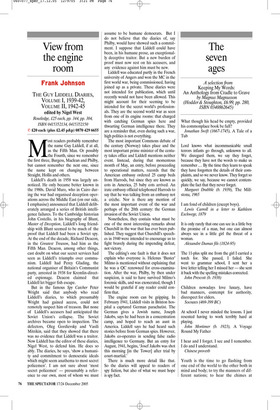View from the engine room
Frank Johnson
THE GUY LIDDELL DIARIES, VOLUME I, 1939-42, VOLUME II, 1942-45 edited by Nigel West Routledge, £25 each, pp. 344, pp. 304, ISBN 0415352134, 0415352150 ✆ £20 each (plus £2.45 p&p) 0870 429 6655 Most readers probably remember the name Guy Liddell, if at all, as the Fifth Man. Or possibly the Fourth, since we remember the first three, Burgess, Maclean and Philby, but cannot remember the next one, since the name kept on changing between Straight, Hollis and others.
Liddell’s death in 1958 was largely unnoticed. He only became better known in the 1980s. David Mure, who in Cairo during the war had organised deception operations across the Middle East (on our side, I emphasise) announced that Liddell deliberately arranged a series of British intelligence failures. To the Cambridge historian John Costello, in his biography of Blunt, Master of Deception, Liddell’s long friendship with Blunt seemed to be much of the proof that Liddell had been a Soviet spy. At the end of the decade, Richard Deacon, in the Greatest Treason, had him as the Fifth Man. Deacon, among other things, cast doubt on what our secret services had seen as Liddell’s triumphs over communism. Liddell had Percy Glading, the national organiser of Britain’s Communist party, arrested in 1938 for Kremlin-directed espionage. Deacon claimed that Liddell let bigger fish escape.
But in the famous Spy Catcher Peter Wright said that anybody who read Liddell’s diaries, to which presumably Wright had gained access, could not remotely suspect him of treason. But none of Liddell’s accusers had anticipated the Soviet Union’s collapse. The Soviet archives became open to inspection. The defectors, Oleg Gordievsky and Vasili Mitrikin, said that they showed that there was no evidence that Liddell was a traitor. Now Liddell has the editor of these diaries, Nigel West, to defend him. He does so ably. The diaries, he says, ‘show a humanity and commitment to democratic ideals which might seem anathema to most secret policemen’. I am not sure about ‘most secret policemen’ — presumably a reference to our own, most of whom we must assume to be humane democrats. But I do not believe that the diaries of, say Philby, would have showed such a commitment. I suppose that Liddell could have been, in his humane prose, an exceptionally deceptive traitor. But a new burden of proof must now rest on his accusers, and any evidence against him must be new.
Liddell was educated partly in the French university of Angers and won the MC in the first world war, being commissioned, having joined up as a private. These diaries were not intended for publication, which until recently would not have been allowed. This might account for their seeming to be intended for the secret world’s professionals. They are the second world war as seen from one of its engine rooms: that charged with catching German spies here and thwarting German intelligence there. They are a reminder that, even during such a war, high politics is not everything.
The most important Commons debate of the century (Norway) takes place and the most important prime minister of the century takes office and Liddell mentions neither event. Instead, during that momentous month of May, an entry, before proceeding to operational matters, records that the American embassy ordered 25 camp beds from Harrods, but since they are known as cots in America, 25 baby cots arrived. An irate embassy official telephoned Harrods to say that he was talking from an embassy not a crèche. Nor is there any mention of the most important event of the war and perhaps of the 20th century: the German invasion of the Soviet Union.
Nonetheless, they contain what must be one of the most interesting remarks about Churchill in the war that has ever been published. They suggest that Churchill’s speeches in 1940 were intended to encourage us to fight bravely during the impending defeat, not victory.
The editing’s one fault is that it does not explain who everyone is. Helenus ‘Buster’ Milmo is mentioned without explaining that he was a QC renowned for cross-examination. After the war, Philby, by then under suspicion, is said to have survived Milmo’s forensic skills, and was exonerated, though I would be grateful if any reader could confirm that.
The engine room can be gripping. In February 1941, Liddell visits in Brixton hospital a captured German parachutist. The German gives a Jewish name, Joseph Jakobs, says he had been in a concentration camp, and hoped to reach an aunt in America. Liddell says he had heard such stories before from German spies. However, Jakobs co-operates in sending false radio intelligence to Germany. But an entry for August, 1941, begins, ‘Josef Jakobs was shot this morning [in the Tower] after trial by court-martial.’ There is much more detail like that. So the diaries will appeal to readers of spy fiction, but also of what we must hope is spy fact.


















































































 Previous page
Previous page